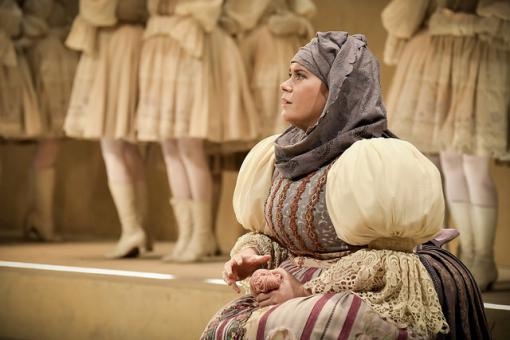The main programme focus of this year’s Janáček Brno 2018 international festival is the performance of all of the composer’s musical-dramatic works. After the popular success of Káťa Kabanová and the precisely staged The Makropulos Affair yesterday it was the turn of the Polish ensemble Teatr Wielki from Poznan with a performance of Jenůfa, a work which, twelve years after its Brno premiere in 1904 opened the doors to the international musical scene to Leoš Janáček.
This realistic drama from the environment of a Moravian village by Gabriela Preissová, Jenůfa is the first prose text put to music in Czech opera. In this tragic tale which is a sharp and unforgiving critique of social relations and conventions, Leoš Janáček manages, despite cuts in the libretto to treat the feelings of the characters cautiously and keeps it whole and the original interpretation unaffected. And similarly sensitive is the conception of Jenůfa by the director and author of the production Alvis Hermanis. Against the effective ornamental art nouveau backdrop the main roles were taken by Ilona Krzywicka as Jenůfa, Eliška Weissová as Kostelnička and Olga Maroszek as the Grandmother. The male roles had the tenors Titusz Tóbisz as Laca and Piotr Friebe in the role of Števa. The orchestra was conducted by the conductor and artistic director of the Stanisław Moniuszko Grand Theatre Opera in Poznan, Gabriel Chmura.
Already from the first notes of the overture the audience was confronted with a production language so unusual and full of contrasts that for many viewers the artistic approach to the scenes must have remained a mystery to the end. The flood of ornaments and visual sensations did not promise a simple interpretation. Just from the constant presence on stage of a group of dancers in white costumes who with their movements began to tell the story, it was clear that even the choreography resorted to a certain ornamentation and lack of articulation, as well as the exceptionally successful and eye-catching costumes. The rich decoration was part of folklore and yet hard to place in terms of location. The pictures by Alfons Mucha and Joža Úprka projected onto the stage however did not provide anything important. These unobtrusively occupied the attention of the eye, while the majority of the perception was drawn by the replicas of the characters.
The vocal roles surprised with their static natures, and the props were also kept to the absolute minimum. The interpreters accompanied their words with emphatic, even schematic gestures and vocal effects that made possible complete comprehension and did not allow a single inner movement.
The division of space in the 1st and 3rd acts into three levels for soloists, dancers and choir worked completely in all the dramatic situations and organically underlined the transformations. The second act as a peculiar, intimate and contrasting in plot calls for a completely different approach. In this production the key events of this drama were transferred to the realistic backdrop of the twentieth century. Starched costumes disappear and things become more normal. There are also courageous props like coloured lights on sacred images and functioning domestic appliances. Even the vocal expression of the artists under the influence of the tense situation approaches normal speech and in places completely loses its cultivated tones, especially in the impressive conclusion to the act as embodied by Eliška Weissová as the Kostelnička.
The performances of the main figures were balanced and always at the highest level. Ilona Krzywicka as Jenůfa avoided glissandi in the demanding interval jumps and her performance was outstanding especially on the high notes. In her role Eliška Weissová was an equal partner with an appropriately coloured voice. Piotr Friebe as the profligate Števa brilliantly manifested a deliberate and libretto-based coarseness of expression, both as an actor and a singer. His counterpart, the authoritative Titusz Tóbisz, seemed as if thinking in terms of the whole production and all the vigour and strength of his voice was reserved for the most fundamental exclamations for the story. The choirs impressed with their powerful sound, although the female choir third act, though visually static, showed more energy and sounded perhaps a little better.
Overall the Poznan Jenůfa exuded respect for the work and the intentions of its creators. The admirable direction gave up his own interpretation in favour of the communication contained in the libretto and the music. Thanks to the above average level of all the components of the production the Brno audience was able to perceive a key Czech work of music in a form that was at once new, bravely full and also humbly clear.
Conductor: Gabriel Chmura
Director: Alvis Hermanis
Stage sets: Alvis Hermanis
Costumes: Anna Watkins
Choreography: Alla Sigalova
Lighting design: Gleb Filshtinsky
Projection: Ineta Sipunova
Choirmaster: Mariusz Otto
Cast: Jenůfa: Ilona Krzywicka – soprano
Laca Klemeň: Titusz Tóbisz – tenor
Števa Buryja: Piotr Friebe – tenor
Kostelnička Buryjovka: Eliška Weissová – soprano
Grandmother Buryjovka: Olga Maroszek – mezzosoprano
Stárek: Rafał Korpik – bass
































No comment added yet..